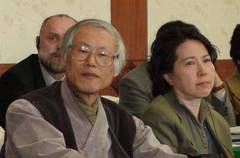"Peace is the opposite of security"

Participants at the International Peace Symposium on "Peace and Human Security: Global Insecurity and Overcoming Violence" in Seoul (South Korea). Photo: Schneiss/DOAM
"Peace is the opposite of security" - This quotation from Dietrich Bonhoeffer became one of the leading sentences during an international ecumenical conference, held in Seoul from March 31 to April 4. Some 60 representatives from Japan, Germany and South Korea got together to discuss the UN-concept on "human security".
Learning from the many cases in which the international community was not able to intervene to protect people from genocide, the concept of human security shifts the subject of security from nations to individuals. During the ecumenical conference the concept was discussed and analyzed from the perspective of political sciences, sociologists, and theologians as well as some activists. The experience from Europe, Japan and Korea shows, that in reality the concept is misused for a growing militarization of foreign politics. The so-called "war on terror" seems to justify military interventions for the sake of security. Leading political parties try to change national constitutions in order to provide the legal framework, like in Japan (Art. 9) and Germany. The new European Treaty (Lisbon Treaty) is asking the EU-member states to "improve progressively their military capabilities".
The speakers criticized the misuse of the concept of "human security" for its violent and exclusive approach. "The primary goal for Christians can never be to achieve a high-scale security at the cost of others, but rather to work for peace and to strive to overcome violence and insecurity for all, starting with the weakest of society", says the open letter that was issued at the end of the conference, held in the Academy Hotel. In addition it speaks against the claim to build peace by claiming full safety. A realistic anthropology from Christian perspective would take into account vulnerability, since vulnerability is a mark of being human. "Vulnerability is not to be deplored, but to be accepted and appreciated, for its counter-side is our receptiveness, our ability for love, compassion, and sympathy" the representatives summarized their findings.
The letter is sent to the churches of the three countries, to the World Council of Churches as well as to the governments. After a one day exposure trip to North Korea, the participants ask for lifting the economic sanctions against North Korea and for negotiations for a peace treaty between North and South Korea.
The conference, which was organized by German East Asia Mission, Korea Peace Foundation, and Tomisaka Center Tokyo, ask the World Council of Churches (WCC) to initiate and support an international ecumenical study project on "human security" and overcoming violence, and to bring this topic to the International Ecumenical Peace Convocation planned for 2011 to mark the culmination of the "Decade to Overcome Violence".
Seoul / Korea, April 4, 2008
View the photo gallery of the symposium
Downloads:
- Letter to the Churches, to the World Council of Churches, and to Governments - English version (pdf, 157 Kb)
- Brief an unsere Kirchen, den Ökumenischen Rat der Kirchen und an Regierungen - German version (pdf, 154 Kb)
- List of participants in the Seoul conference (pdf, 99 Kb)



